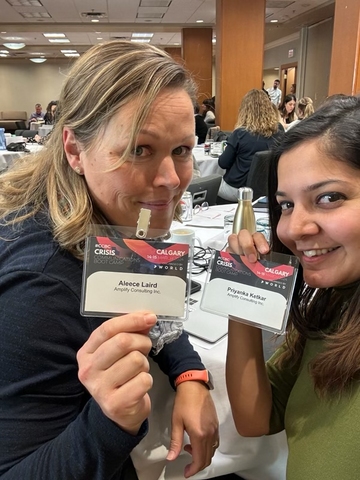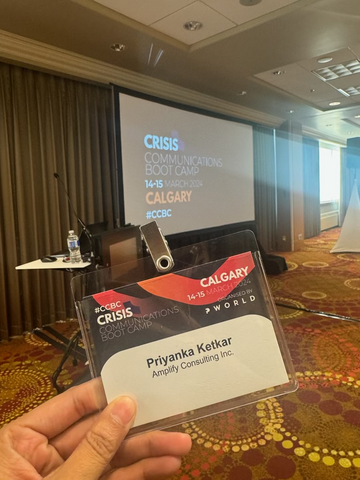Crisis Communications Bootcamp
- Priyanka Ketkar

- Aug 14, 2024
- 3 min read
Updated: Sep 7, 2024
Article by Priyanka Ketkar
Earlier this year, Aleece and I attended a Crisis Communications boot camp in Calgary, AB, organized by P World, where some of North America’s most talented crisis communications professionals had gathered. The conference featured a stellar lineup of speakers from diverse industries, each bringing their own unique perspectives and tried-and-tested strategies.
Kim Blanchette, Senior Vice President at Argyle, opened the sessions by focusing on the fluid nature of crisis communications. Michael Morrison of Mass General Brigham drew from his experiences with the Boston Marathon bombing and the COVID-19 pandemic to discuss the vital role of messaging and tone during a crisis. Ashley Korte of Equifax emphasized the pressing issue of cybersecurity breaches and their impact on organizational reputation, and Kurt Heinrich of the University of British Columbia discussed the challenges posed by 'cancel culture'.
Tom Chervinsky from TELUS Health focused on the importance of clear communication with government bodies during a crisis, while Conor Chell of KPMG Canada explored the intricacies of Environmental, Social, and Governance communications. Christiana Antoniou from Pfizer shared about Pfizer’s rapid communication response during the pandemic, and Julie Kavanaugh from the Ottawa Police Service shared insights into the communication strategies employed during the Freedom Convoy 2022 protests.
Kathryn Kolaczek of Alchemy Communications wrapped up the second day with a full-day workshop on crisis communications in the cancel culture era.
With such a power-packed two days there was a lot to learn; here are my top 7 key takeaways:
Strategic Planning: Understand the importance of a well-structured communications strategy and ensure you have a crisis communications plan in place that anticipates potential crises and outlines clear response protocols. Make sure your plan has buy-in from the board, leadership, and staff and make sure it notes the often-overlooked need to document crises thoroughly as they unfold and the value of simulations in preparing for potential scenarios.
Brand vs. Reputation: Recognize the difference—brand is the promise you make; reputation is how well you keep that promise. Using these terms interchangeably can cloud strategic judgment during crises.
The Three T's: Emphasize Teamwork, Trust, and Transparency in all crisis communications to build and maintain stakeholder confidence.
Go Beyond Apologies: Move beyond mere apologies to implement concrete actions and transparent next steps. Make sure your responses are genuine and aimed at rectifying issues.
Real Cost of Crisis: Strive to understand the essence of crisis impact—its true cost. It’s not just about immediate financial setbacks but also long-term reputational damage and operational disruptions. Identifying potential crises before they emerge and understanding their possible impacts can save much more than just money.
Staff Impact and Support: Securing internal support is crucial, as internal perceptions often shape external crisis responses. Moreover, regularly checking in on your staff’s well-being, recognizing their critical role in managing crises and how they can impact them, and maintaining operational continuity are very important during challenging times.
Feedback, Learning, Collaboration, and Community Support: Actively adjust strategies based on feedback, engage in industry-wide collaboration, study other PR crises and strategies to stay informed, improve your own crisis management approaches, and support mutual learning within your teams to enhance overall crisis preparedness.
The two-day experience not only deepened my understanding of crisis communications but also gave me a unique opportunity to exchange ideas with peers equally passionate about public relations and building the reputation of our remarkable clients. But the biggest takeaway was realizing how many of these strategic suggestions Amplify Consulting Inc. already has in place for our clients and how we are well-positioned and not lagging on any of the current industry trends.












Comments